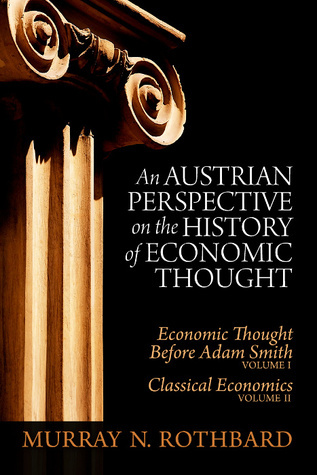

An Austrian Perspective on the History of Economic Thought
4.4(336 readers)
This is one of Rothbard’s most important scholarly works. In the first volume, Rothbard traces the history of economics from the ancient Greeks to Adam Smith; and in the second volume, he discusses British classical economics, the French school of classical liberalism, and Marxism.
Rothbard rejects the Whig view, according to which the history of economics is a story of constant progress. To the contrary, he sees economics as a battle between two conflicting schools of thought. The correct one explains prices through subjective value: this approach culminates in the Austrian School. The other view explains prices by cost, especially labor cost.
In the first volume, Rothbard stresses the great contributions of the Spanish Scholastics to the subjective tradition. Other great subjectivists included Turgot and Cantillon. Unfortunately, Adam Smith’s labor cost theories became the dominant view, especially in Britain. Rothbard regards Smith as largely a retrograde influence on economic theory.
The second volume contains a brilliant critique of Ricardian economics, showing the constraints on theory entailed by Ricardo’s static and pseudo-mathematical method. Ricardo’s successor John Stuart Mill is the object of a devastating intellectual portrait. Marxism is subjected to a merciless demolition, and Rothbard shows the roots of this system in metaphysical speculation. The French classical liberals such as Bastiat, on the other hand, contributed to the subjectivist school. A further highlight of this volume is a discussion of the bullionist controversy: the views of the Banking and Currency Schools receive extensive analysis.
Rothbard rejects the Whig view, according to which the history of economics is a story of constant progress. To the contrary, he sees economics as a battle between two conflicting schools of thought. The correct one explains prices through subjective value: this approach culminates in the Austrian School. The other view explains prices by cost, especially labor cost.
In the first volume, Rothbard stresses the great contributions of the Spanish Scholastics to the subjective tradition. Other great subjectivists included Turgot and Cantillon. Unfortunately, Adam Smith’s labor cost theories became the dominant view, especially in Britain. Rothbard regards Smith as largely a retrograde influence on economic theory.
The second volume contains a brilliant critique of Ricardian economics, showing the constraints on theory entailed by Ricardo’s static and pseudo-mathematical method. Ricardo’s successor John Stuart Mill is the object of a devastating intellectual portrait. Marxism is subjected to a merciless demolition, and Rothbard shows the roots of this system in metaphysical speculation. The French classical liberals such as Bastiat, on the other hand, contributed to the subjectivist school. A further highlight of this volume is a discussion of the bullionist controversy: the views of the Banking and Currency Schools receive extensive analysis.
Publisher
Ludwig von Mises Institute
Publication Date
2/1/2006
ISBN
9780945466482
Pages
1084
Categories
About the Author

Murray N. Rothbard
Murray Newton Rothbard was an influential American historian, natural law theorist and economist of the Austrian School who helped define modern libertarianism. Rothbard took the Austrian School's emphasis on spontaneous order and condemnation of central planning to an individualist anarchist conclusion, which he termed "anarcho-capitalism".
In the 1970s, he assisted Charles Koch and Ed Crane to found the Cato Institute as libertarian think tank.
In the 1970s, he assisted Charles Koch and Ed Crane to found the Cato Institute as libertarian think tank.
Questions & Answers
Reader Reviews
Loading comments...